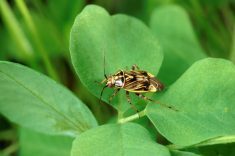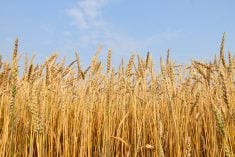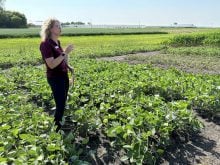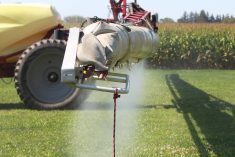UPDATED – Thursday July 9, 2020 – 1020 CST – updated to include comments from Richardson Milling – Starting next year, Richardson Milling will no longer purchase oats that have been sprayed with pre-harvest glyphosate or any type of desiccant.
Richardson informed producers of its new policy last month in an email to oat growers in Western Canada.
“Richardson has announced they won’t be accepting any oats, at all, treated with glyphosate as a pre-harvest (aid),” said Jenneth Johanson, president of the Prairie Oat Growers Association.
Read Also

Farming Smarter receives financial boost from Alberta government for potato research
Farming Smarter near Lethbridge got a boost to its research equipment, thanks to the Alberta government’s increase in funding for research associations.
“It would have been a month or month and a half ago…. They announced it to producers. Anyone who was on a customer list that had sold them any oats previously.”
Richardson, in an email to The Western Producer, explained that its desiccant policy begins January 2021.
“Richardson Milling will only source Canadian oats that have not been treated with a pre-harvest desiccant…. Our oat purchasing programs and their treatment of pesticides apply to all products and are not limited to glyphosate” said Tom Hamilton, senior vice-president for agribusiness operations.
“There is growing consumer demand for processed oat products that are derived from oats that were not treated with a pre-harvest desiccant. We developed our Richardson Pre Harvest Aid Free Program as a result of an informed business decision that was entirely based on customer and consumer demand.”
However, Richardson makes a distinction between its milling operations and other parts of its business. Richardson Pioneer, its grain handling and crop input division, will “market desiccant oats based on market demand,” Hamilton said.
“Oats that were treated with a pre-harvest desiccant will continue to be purchased and sold to customers that continue to buy oats on that basis.”
The company’s decision will have a significant impact on oat growers because Richardson Milling is one of the major oat buyers in Western Canada. It has oat processing mills in Portage la Prairie, Man, Martensville, Sask. and Barrhead, Alta.
Several years ago, Grain Millers, which mills oats in Yorkton, Sask., stopped buying oats that are sprayed with glyphosate before to harvest.
With two of the major buyers taking a clear position, it could effectively end the use of glyphosate as a pre-harvest aid for oats.
“That’s the way the producers are feeling, at this moment,” said Johanson, who farms near Lac du Bonnet, Man.
“As a producer … who has sold to them (Richardson) in the past, I was disappointed, but as a member of the Prairie Oat Growers, we’ve been having numerous conversations over the last three years with the grain companies and the milling companies. They’ve made it very clear that supplying customers, with what they want, is very important to them.”
Consumer groups, particularly in the United States, have been pressuring General Mills and PepsiCo, the owner of Quaker Oats, about glyphosate residues in granola bars and breakfast cereals.
The Environmental Working Group published reports suggesting that residues of glyphosate, the active ingredient in Roundup herbicide, are present in granola, instant oats and snack bars that are popular with kids.
“Glyphosate … was found in all but two of 45 samples of products made with conventionally grown oats,” the Environmental Working Group said in 2018.
“Almost three-fourths of those samples had glyphosate levels higher than what EWG scientists consider protective of children’s health with an adequate margin of safety.”
In August 2018, a California court awarded $289 million to a school groundskeeper who claimed that exposure to Roundup caused his cancer.
The court decision had a gigantic impact on public perceptions of glyphosate and corporate fears of potential lawsuits.
“The big turning point was the court ruling, of the glyphosate case that happened in California,” Johanson said.
Then, in the fall of 2018, Dr. Oz did a show on Roundup residues and breakfast cereals.
“That was another big turning point,” Johanson said.
“As a producer organization, we were felling like the days were numbered for using glyphosate in oats as a pre-harvest tool.”
Last month, Bayer committed more than US $10 billion to resolve thousands of lawsuits in the U.S., where claimants said exposure to glyphosate contributed to their development of cancer.
The lawsuits stem from a 2015 decision by the International Agency for Research on Cancer, a division of the World Health Organization. IARC scientists classified glyphosate as probably carcinogenic to humans.
Since then, numerous regulatory bodies, including Health Canada and the U.S. Environmental Protection Agency, reviewed the scientific evidence and concluded the herbicide is safe.
“No pesticide regulatory authority in the world currently considers glyphosate to be a cancer risk to humans at the levels at which humans are currently exposed,” Health Canada said in January 2019.
Richardson supports Health Canada’s stance on glyphosate.
“We firmly acknowledge that registered products, including glyphosate, are safe when used according to labels directions. Our new program is simply intended to allow us to meet and manage our customer specifications,” Hamilton said.
General Mills, the maker of Cheerios, has asked growers to use fewer pesticides, but the company has never taken a firm position on pre-harvest glyphosate.
A company spokesperson told the Western Producer a couple of years ago that it worried about the consequences of an outright ban on the practice. Oat growers in Manitoba and Saskatchewan might seed fewer oats, which would reduce the supply for General Mills and other buyers.
With Richardson’s decision, some farmers may back away from oats in 2021. Growing oats without pre-harvest glyphosate can be risky because rain in late August and early September can damage the quality of the crop. Many oat growers spray glyphosate to control weeds and dry down the oats before harvest and then combine the crop at a later date while it is still standing.
Johanson said there are two possible outcomes from Richardson’s decision: oat buyers will have to increase prices to offset the production risk or acres will drop.
“I would suspect we could see a decline in acres. The farmers that still own swathers, they may stay with their half section or section of oats every year.”
But buying a swather is a cost, and operating the swather is a significant labour cost.
Farmers who straight-cut their oats at harvest may choose to grow something other than oats.
“Producers like myself … I don’t own a swather,” Johanson said.
“On my own farm, my acres will decrease significantly, as much as probably 50 percent.”
Contact robert.arnason@producer.com


















